 Petzlover
Petzlover Both Bergamasco and Dogo Sardesco are originated from Italy. Bergamasco may grow 6 cm / 2 inches shorter than Dogo Sardesco. Bergamasco may weigh 7 kg / 15 pounds lesser than Dogo Sardesco. Bergamasco may live 3 years more than Dogo Sardesco. Both Bergamasco and Dogo Sardesco has almost same litter size. Bergamasco requires Moderate Maintenance. But Dogo Sardesco requires Low Maintenance
Both Bergamasco and Dogo Sardesco are originated from Italy. Bergamasco may grow 6 cm / 2 inches shorter than Dogo Sardesco. Bergamasco may weigh 7 kg / 15 pounds lesser than Dogo Sardesco. Bergamasco may live 3 years more than Dogo Sardesco. Both Bergamasco and Dogo Sardesco has almost same litter size. Bergamasco requires Moderate Maintenance. But Dogo Sardesco requires Low Maintenance
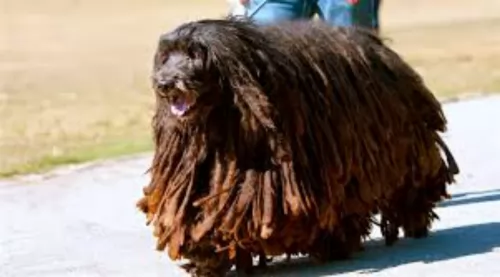 The Bergamasco comes from northern Italy. This medium sized sheepdog is of ancient origin. Known as an Italian sheep herding breed, his name actually comes from the town where he comes from - Bergamo.
The Bergamasco comes from northern Italy. This medium sized sheepdog is of ancient origin. Known as an Italian sheep herding breed, his name actually comes from the town where he comes from - Bergamo.
It was after World War II that there was danger that this breed would disappear as the need for herding and shepherding was diminishing. An Italian breeder, however, Dr. Maria Andreoli, stepped in to save the breed.
It was in 2015 that the American Kennel Club also changed the breed’s status from Miscellaneous to the Herding Group.
 This is an ancient working dog breed which hails from the Italian island of Sardinia. When you do research, you find that no one is sure as to this dogs exact origin, and there are a number of theories as to how the dog developed.
This is an ancient working dog breed which hails from the Italian island of Sardinia. When you do research, you find that no one is sure as to this dogs exact origin, and there are a number of theories as to how the dog developed.
Regardless of how the Dogo Sardesco came about, it is a valued companion of farmers in Sardinia, being appreciated for its protective nature.
The dog is a kind of Molosser or Mastiff dog. In the past the dog has been used as a working and hunting dog, and today he is a popular dog in mainland Italy. He is also known as Sardinian Mastiff, Sardinian Molosser and Dogo Sardo.
The Dogo Sardesco isn’t recognized today by international kennel clubs, and breeders on the island of Sardinia have done nothing to form a breed club for the dog.
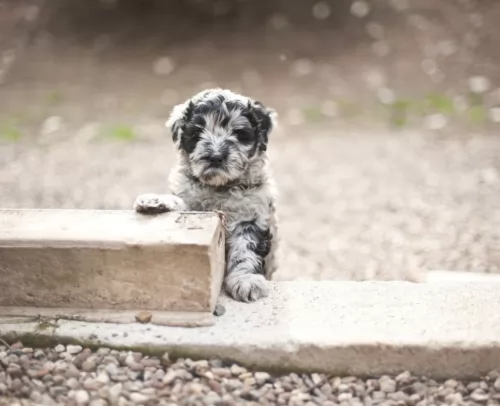 This medium sized sheepdog stands 54 – 62cm in height and weighs up to 38 kg as an adult. It is his coat which draws the most attention. It is of a coarse texture and actually greasy to the touch. It actually forms into strands or almost like dreadlocks from the top of the body, so that people agree he is one of shaggiest dog breeds there are.
This medium sized sheepdog stands 54 – 62cm in height and weighs up to 38 kg as an adult. It is his coat which draws the most attention. It is of a coarse texture and actually greasy to the touch. It actually forms into strands or almost like dreadlocks from the top of the body, so that people agree he is one of shaggiest dog breeds there are.
From age 1 on the coat starts to become woolly, and then the flocks start to form. As these clumps of hair appear, it will become necessary to separate them into smaller cords by hand to ensure attractive formation Brushing isn’t necessary but a big toothed comb can keep their hair ‘groomed’.
The colour of the coat is solid grey with patches of shades of grey and sometimes black. His dense, heavy coat makes it that he is suited to cooler climates. Because he is a herding dog, he wouldn’t do well in an apartment but would suit a home with a large garden.
He is intelligent and social but will need firm handling as he is a boisterous dog. He has a muscular yet compact body with a large head, long tail, high-set semi-drooping ears and large, gentle looking brown eyes. Although not instinctively aggressive, he makes an excellent watch dog with strong protective instincts to protect his human family.
He views new people into his circle with suspicion and wariness. He is good with kids and pets in the home and is playful and energetic.
 The dog Sardesco is a medium to large sized dog generally measuring 56 to 68 cm at the withers and weighing roughly 30 to 45 kg.
The dog Sardesco is a medium to large sized dog generally measuring 56 to 68 cm at the withers and weighing roughly 30 to 45 kg.
Because the dog isn’t bred to specific standards, it varies in appearance, but it is a powerful looking dog, being lean and athletic. The dog’s tail is traditionally docked, but with tail docking being frowned upon, the tail is left long and the dog loses its distinctive look.
The head of the dog is large and the ears are also traditionally cropped to be very short. Left naturally, the ears fold down closely to the sides of the head.The eyes are small and amber colored. The coat is short and smooth, but thick, and while it comes in many colors, the more regular color is red, brown, black, grey or brindle.
The Dogo Sardesco becomes a loyal family pet, more so when he has been trained and socialized. Although he is a devoted and affectionate dog, forming particularly strong bonds with his human family, he isn’t recommended for homes where there are young children.
He also doesn’t take too kindly to other pets in the home. This is because they are a strong-willed, dominant breed and might therefore not be a good choice for first-time dog owners.
Because Sardinian breeders have focused on developing an aggressive dog, he has become a dog suspicious of- and aloof with strangers. He is stubborn and self-willed, and to make him more obedient and amicable, he will require training and socialization. He is an alert, intelligent dog and this makes him an excellent watch dog.
The Sardinian Mastiff is an active dog too and won’t do well in a home where the people aren’t interested in exercise. He is the kind of dog that will need to be taken with you on walks, and he will love to spend time running alongside you when you go running or cycling.
He won’t adapt too well to life in the city, particularly when there is just a tiny garden.
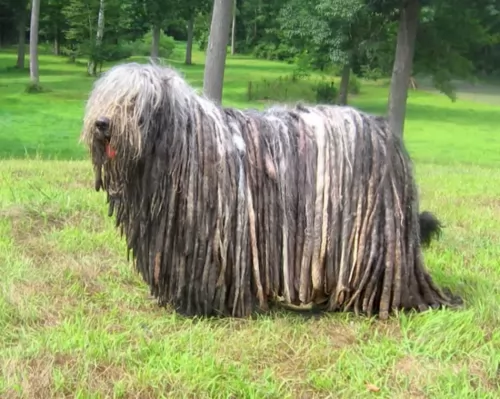 This is a working dog so they are naturally alert. He is also intelligent and independent and this independence is seen with training as he doesn’t take easily to following instructions, becoming stubborn. You’ll certainly want to have your Bergamasco socialized and trained as he can be a boisterous dog, bounding with energy.
This is a working dog so they are naturally alert. He is also intelligent and independent and this independence is seen with training as he doesn’t take easily to following instructions, becoming stubborn. You’ll certainly want to have your Bergamasco socialized and trained as he can be a boisterous dog, bounding with energy.
This is a dog that will need to be kept busy and provided with plenty of activities so that he remains happy, playful and relaxed.
Lively and intelligent, these dogs also form strong bonds with their owners and get on well with the children in the home. He will take well to country life as opposed to living in the city.
 The Dogo Sardesco has always performed his role as a working dog well, and this is a reliable watch dog as well as the dog takes his job of guarding his human family seriously.
The Dogo Sardesco has always performed his role as a working dog well, and this is a reliable watch dog as well as the dog takes his job of guarding his human family seriously.
With his aggressive temperament, he has appeared on the list of banned breeds, and this is why he isn’t an ideal choice for homes where there are small children, as some small children haven’t been taught how to treat a dog with respect.
However, when properly trained and socialized he becomes an excellent companion dog. He has an intimidating look about him, but when he is with his human family, another side comes out and he is affectionate, loving and protective.
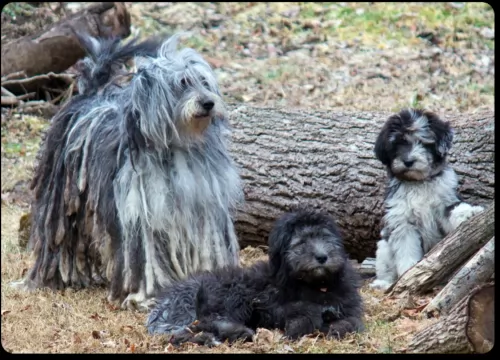 Your Bergamasco can live to be 13 to 15 years of age and he is considered to be a healthy breed. Nonetheless you want to be aware of health issues that are common to this breed
Your Bergamasco can live to be 13 to 15 years of age and he is considered to be a healthy breed. Nonetheless you want to be aware of health issues that are common to this breed
he is vulnerable to heat. He can die of heat exhaustion quicker than other breeds
keep an eye on him for hip dysplasia, progressive retinal atrophy and skin allergies
 The Dogo Sardesco is a relatively healthy breed who is unlikely to suffer with ailments common to dogs, but nonetheless there are some diseases or conditions that you might want to be aware of with your dog.
The Dogo Sardesco is a relatively healthy breed who is unlikely to suffer with ailments common to dogs, but nonetheless there are some diseases or conditions that you might want to be aware of with your dog.
Skeletal and visual problems can occur in this breed. Both hip- and elbow dysplasia are common orthopedic disorders in dogs and they can cause a lot of pain and discomfort and even cause lifelong disability.
Genes and environmental factors play a part in your dog developing this disease.If he has been diagnosed as having hip or elbow dysplasia, get your dog to the vet as there are treatments which can at least make your pet a lot more comfortable.
Remember that feeding your puppy Dogo Sardesco too much food which is particularly high in calories can mean him growing too fast, and this can contribute to this hip dysplasia problem.
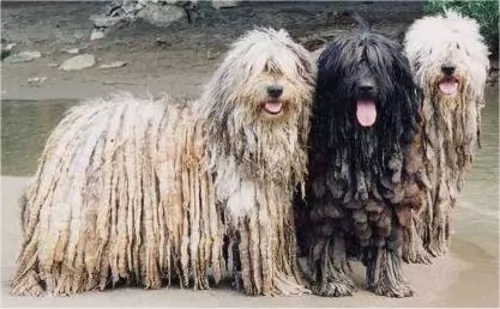 The Bergamasco isn’t a shedder but his coat will need to be combed once a week just to keep it in order. You don’t want to bath him too often, especially during the Winter as his coat takes a long time to dry. It isn’t recommended to shave a Bergamasco as the coat regulates the dogs temperature – keeping him warm and cold as the weather demands.
The Bergamasco isn’t a shedder but his coat will need to be combed once a week just to keep it in order. You don’t want to bath him too often, especially during the Winter as his coat takes a long time to dry. It isn’t recommended to shave a Bergamasco as the coat regulates the dogs temperature – keeping him warm and cold as the weather demands.
They thrive on a blend of kibble (dry) mixed with raw and-or moist food once or twice a day. Remember to include quality chicken, turkey, etc. mixed with some vegetables and rice into your dog’s diet. Ensure a constant supply of fresh water in an easily-cleanable bowl.
Balls and ropes are important for building muscle strength and burning energy. Remember your Bergamasco is a working breed and will need plenty of games and exercise.
 Dog owners who don’t like the idea of spending too much money on grooming will appreciate that the Dogo Sardesco is a very low maintenance breed, and that a good brushing twice a week will keep the dog’s coat shiny and healthy.
Dog owners who don’t like the idea of spending too much money on grooming will appreciate that the Dogo Sardesco is a very low maintenance breed, and that a good brushing twice a week will keep the dog’s coat shiny and healthy.
As with all other dogs, he will need to have his teeth brushed to remove plaque build up. Not only does plaque lead to dental disease, but bad teeth can lead to other health issues too.
Nail clipping will also be necessary if your pet doesn’t wear the nails down naturally from getting to run on a hard surface from time to time.